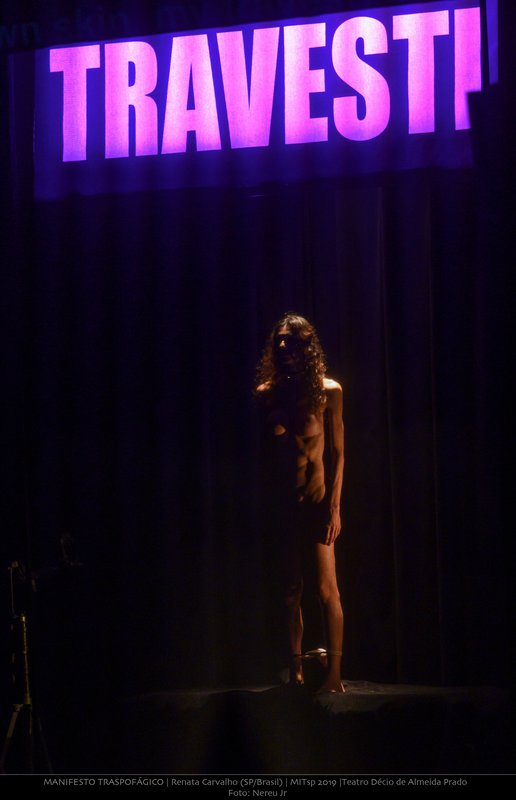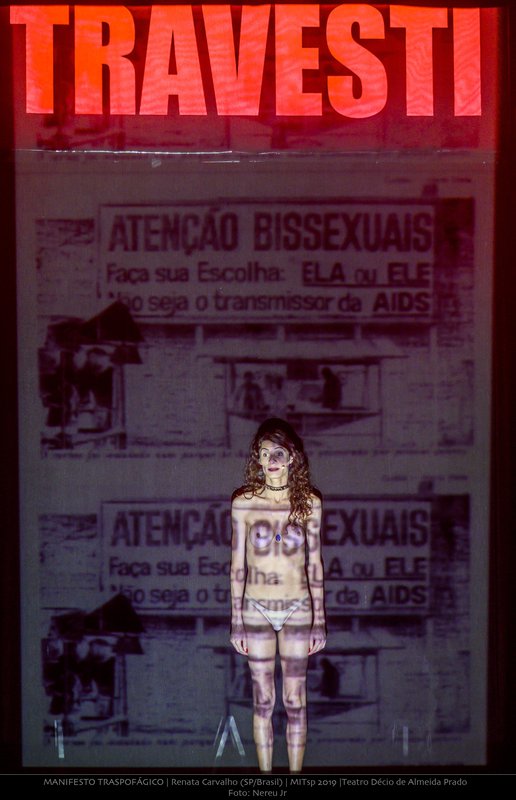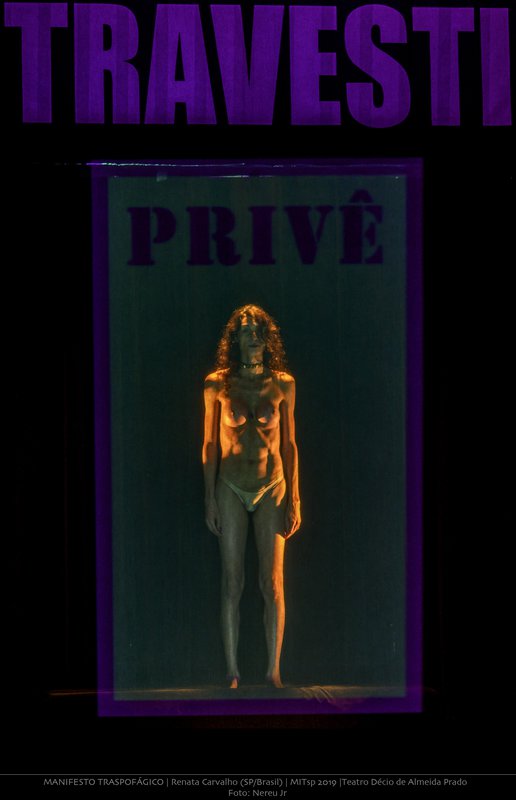Theatre
January 21st and 22nd,Santiago
Dramaturge and Actress: Renata Carvalho| Director: Luiz Fernando Marquez | Lighting: Wagner Antonio | Video Art: Cecilia Lucchesi | Lighting Adaptation: Juliana Augusta | Production: Corpo Rastreado | Coproduction: MITsp and Risco Festival | Broadcasting: Corpo a Fora and FarOFFa.
Renata Carvalho
Director
The body as a scenic element for manifesting activism
Renata is a Brazilian-born actress, dramaturge and transpologist (transgender anthropologist) who has specialized in transvestite/trans corporeality studies under the term “Transpology”. This concept seeks to challenge the dehumanizing social constructs permeating the collective imaginary of what it means to be trans.Founder of the Movimiento Nacional de Artistas Trans (Brazil), she created the Manifesto of Trans Representativeness, a response to the practice of fake trans (when trans roles are interpreted by cisgender artists). She also founded COLECTIVO T in Sao Paulo, the first art collective formed only by transgender artists. She has written and staged three plays to date: El Evangelio según Jesús, Reina del Cielo - censored five times in Brazil until today - , Dominio Público and Manifiesto Transpofágico.
-Because of the scenic proposal, which situates the body as a scenic artifact, in an internationally recognized performance. The Festival d'Automne à Paris highlighted that “By exposing her own body, Renata Carvalho lays bare the historical exclusion and commodification of the transvestite body. In doing so, she tears apart the tortuous roots of prejudices anchored in different areas, such as grammar, medicine and justice.”
-Because of its director, who, according to the Brazilian media G1, "is internationally recognized for her work focused on the issues of the trans body." In addition, the same article recognizes the social importance of Carvalho's work, adding that "it is part of a cultural initiative for the development of society."
-Because of the current events and importance of its subject, which, as mentioned by the Brazilian media Observatorio do Teatro, "narrates the process of the social construction of the trans body, going through sexualization, stereotypes and transphobia."
Queer: A term used to refer to people who do not identify themselves within the binary classification male/female and reject such categorizations. In the words of American philosopher Judith Butler, "queer is an argument against certain norms, against what an adequate lesbian or gay identity constitutes". It is a concept that allows us to recognize identities, genders and sexual orientations outside of any definition, such as the trans and transvestite experiences. As a theory and a way of political activism, the term queer promotes the acceptance of diversity, dissidence and plural logics.
- Check out Renata Carvalho's interview on the role of art in collective struggles, in the framework of the Brazilian Nova Cena Festival here.
On Instagram:
On Facebook:
PRODUCE



COLABORA


Manifiesto Transpofágico
By Renata Carvalho | Directed by Luiz Fernando Marques | Production Corpo Rastreado
- Brazil
- Portuguese (with subtitles)
- approximately 60 minutes
- + 18 years
A body story narrated in first-person that questions the established discourse and breaks with the stigmas about the experience of being a transvestite.
Manifiesto Transpofágico is a montage that explores the experience of the renowned Brazilian transvestite director and activist, Renata Carvalho, who uses her body as scenic material to narrate and reflect the sexualization, stereotypes, structural transphobia, violence, pathologization and social imagery that permeates the transvestite experience in South America and the rest of the world.
Renata Carvalho tells the story of her corporeality; a first-person account that lays bare various aspects of the transvestite reality and invites the audience to observe its corporeal manifestation under a proposal of experimental "travaturgia" - dramaturgy told from the transvestite body.
"Today I decided to dress in my own skin," Renata exclaims in her performance of this play, while the sign behind her flashes “TRAVESTI, TRAVESTI, TRAVESTI”.
In terms of the staging, the actress makes herself available to the scenery, inviting the audience to observe her own body.
Manifiesto Transpofágico
By Renata Carvalho | Directed by Luiz Fernando Marques | Production Corpo Rastreado
- Brazil
- Portuguese (with subtitles)
- approximately 60 minutes
- + 18 years
A body story narrated in first-person that questions the established discourse and breaks with the stigmas about the experience of being a transvestite.
Manifiesto Transpofágico is a montage that explores the experience of the renowned Brazilian transvestite director and activist, Renata Carvalho, who uses her body as scenic material to narrate and reflect the sexualization, stereotypes, structural transphobia, violence, pathologization and social imagery that permeates the transvestite experience in South America and the rest of the world.
Renata Carvalho tells the story of her corporeality; a first-person account that lays bare various aspects of the transvestite reality and invites the audience to observe its corporeal manifestation under a proposal of experimental "travaturgia" - dramaturgy told from the transvestite body.
"Today I decided to dress in my own skin," Renata exclaims in her performance of this play, while the sign behind her flashes “TRAVESTI, TRAVESTI, TRAVESTI”.
In terms of the staging, the actress makes herself available to the scenery, inviting the audience to observe her own body.
Dramaturge and Actress: Renata Carvalho| Director: Luiz Fernando Marquez | Lighting: Wagner Antonio | Video Art: Cecilia Lucchesi | Lighting Adaptation: Juliana Augusta | Production: Corpo Rastreado | Coproduction: MITsp and Risco Festival | Broadcasting: Corpo a Fora and FarOFFa.
Renata Carvalho
Director
The body as a scenic element for manifesting activism
Renata is a Brazilian-born actress, dramaturge and transpologist (transgender anthropologist) who has specialized in transvestite/trans corporeality studies under the term “Transpology”. This concept seeks to challenge the dehumanizing social constructs permeating the collective imaginary of what it means to be trans.Founder of the Movimiento Nacional de Artistas Trans (Brazil), she created the Manifesto of Trans Representativeness, a response to the practice of fake trans (when trans roles are interpreted by cisgender artists). She also founded COLECTIVO T in Sao Paulo, the first art collective formed only by transgender artists. She has written and staged three plays to date: El Evangelio según Jesús, Reina del Cielo - censored five times in Brazil until today - , Dominio Público and Manifiesto Transpofágico.
-Because of the scenic proposal, which situates the body as a scenic artifact, in an internationally recognized performance. The Festival d'Automne à Paris highlighted that “By exposing her own body, Renata Carvalho lays bare the historical exclusion and commodification of the transvestite body. In doing so, she tears apart the tortuous roots of prejudices anchored in different areas, such as grammar, medicine and justice.”
-Because of its director, who, according to the Brazilian media G1, "is internationally recognized for her work focused on the issues of the trans body." In addition, the same article recognizes the social importance of Carvalho's work, adding that "it is part of a cultural initiative for the development of society."
-Because of the current events and importance of its subject, which, as mentioned by the Brazilian media Observatorio do Teatro, "narrates the process of the social construction of the trans body, going through sexualization, stereotypes and transphobia."
Queer: A term used to refer to people who do not identify themselves within the binary classification male/female and reject such categorizations. In the words of American philosopher Judith Butler, "queer is an argument against certain norms, against what an adequate lesbian or gay identity constitutes". It is a concept that allows us to recognize identities, genders and sexual orientations outside of any definition, such as the trans and transvestite experiences. As a theory and a way of political activism, the term queer promotes the acceptance of diversity, dissidence and plural logics.
- Check out Renata Carvalho's interview on the role of art in collective struggles, in the framework of the Brazilian Nova Cena Festival here.
On Instagram:
On Facebook:
PRODUCE



COLABORA




